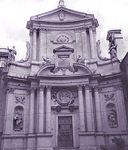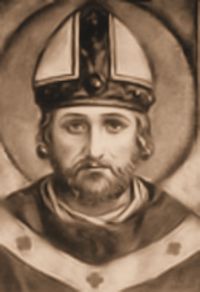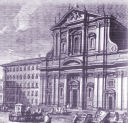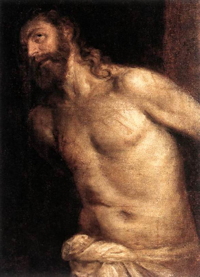Lent: March 16th
Wednesday of the Fifth Week of Lent
Other Commemorations: St. Heribert, Archbishop (RM); St. Jean Brebeuf, Priest and Martyr (RM)
» Enjoy our Liturgical Seasons series of e-books!
"Then in anger his master handed him over to the torturers until he should pay back the whole debt. So will my heavenly Father do to you, unless each of you forgives your brother from your heart." (Mt. 18:35) No one is merciful like God, and no one pardons as God pardons. The mercy of the Jews was confined to forgiving seven times. Jesus desires that His disciples should always forgive — even to seventy times seven times.
Before the reform of the Roman Calendar this was the feast of St. John de Brefeuf. His feast has been transferred to October 19.
| The Station today is at the church of St. Marcellus at the Corso. Legend claims that Pope St. Marcellus (308-309) was sentenced by Emperor Maxentius to look after the horses at the station of the Imperial mail on the Via Lata, where the Via del Corso now lies. He was freed by the people, and hidden in the house of the Roman lady Lucina (see also San Lorenzo in Lucina). He was rearrested, and imprisoned in the stables. |  |
Meditation
We must forgive our neighbor always. This fraternal charity is the source of strength among the members of the Mystical Body: "If two of your shall consent upon earth concerning anything whatsoever they shall ask, it shall be done to them by my Father". This charity should animate us in giving fraternal correction, which should always be free from all vanity, self-love and desire to humiliate and defame.
The Church dispenses Christ's forgiveness through the power of the keys: "whatsoever you shall loose upon earth shall be loosed also in heaven". Christ's pardon of us is limitless. Just as the small quantity of oil, increasing miraculously at the word of Elias, enabled the poor widow to pay all her debts, so the infinite merits of Christ enable us to expiate all our sins.
Love of God and of neighbor imposes on us constant self-denial and self-mastery. Only love working through mortification will enable us to ascend the "holy hill" and dwell in "God's tabernacle". — The Cathedral Daily Missal by Right Rev. Msgr. Rudolph G. Bandas
Things to Do:
- Discuss the idea of forgiveness with your children — emphasizing with today's Gospel that Christ's forgiveness is limitless to those who humbly repent of their offenses against Him. Ask them ways in which they practice this virtue every day, with their sisters and brothers, with their parents, and with their friends.
- Throughout this third week of Lent, often the time when children begin to lose focus or weary of this penitential season, give them something tangible to work on, such as a Lenten Scrapbook, an ongoing activity that will engage their minds and stretch their creativity in putting their faith into pictures.
Saint Heribert
 Heribert was born in Worms and he was the son of Hugo, count of Worms. He was educated in the school of Worms Cathedral and at the Benedictine Gorze Abbey in Lorraine, France. He returned to Worms Cathedral to be provost and was ordained a priest in 994.
Heribert was born in Worms and he was the son of Hugo, count of Worms. He was educated in the school of Worms Cathedral and at the Benedictine Gorze Abbey in Lorraine, France. He returned to Worms Cathedral to be provost and was ordained a priest in 994.
In the same year, Otto III appointed him chancellor for Italy and four years later also for Germany, a position which he held until Otto's death on 23 January 1002. Heribert was made an archbishop of Cologne on 998. Then, he also served Emperor St. Henry.
Heribert built the monastery of Deutz, on the Rhine and performed miracles, including ending a drought. He is thus invoked for rains.
He died in Cologne on March 16, 1021 and was buried at Deutz.
He was already honored as a saint during his lifetime and was canonized by Pope St. Gregory VII about 1074.
—©Evangelizo.org
Patronage: against drought; for rain; Deutz, Germany
Symbols and Representation: archbishop calling down rain by his prayers; man kneeling before Saint Henry II; episcopal attire
Highlights and Things to Do:
- Read more about St. Heribert:
- Watch this short video from gloria.tv on St. Heribert of Cologne.
- His relics were relocated from Old St. Heribert to the Neu-St.Heribert church in Köln-Deutz.

Saturday of the Fourth Week of Lent
Station with San Nicola in Carcere (St. Nicholas in Prison):
Today's Station is at St. Nicholas of Barin in Prison, dedicated to the popular St. Nicholas of Myra or also referred to as St. Nicholas of Bari, whose feast is December 6. It was constructed in the ruins of two temples and the ancient Forum Olitorium, with visible fragments from the ruins reused in the church. The most important of the temples was the Temple of Piety, built by Acilius Glabrius, consul in 191 B.C. The dedication to St. Nicholas was made by the Greek population in the area.
For more on San Nicola in Carcere, see:
For further information on the Station Churches, see The Stational Church.






